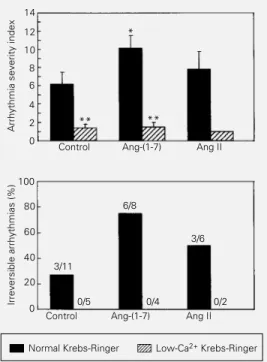Effect of angiotensin-(1-7) on reperfusion arrhythmias in isolated rat hearts
Texto
Imagem




Documentos relacionados
sociated with propofol on myocardial contractility (dP/dt and heart rate), coronary flow, and the incidence of ar- rhythmia in isolated rat hearts.. Methods - Forty albino rats
Figure 1 - Effects of 3 different flow rates on the vasopressor responses to phenylephrine (PE) in the rat tail vascular bed per- fused with Krebs solution (con- stant flow, Ca 2+
The magnitude of the potentiation was dependent on the dose of bradykinin, being present only for the lower doses: Ang- (1-7) doubled the effect of the lower doses of BK while
In addition, during reperfusion no further decrease was observed in +dT/dt or -dT/dt in isolated rat hearts perfused with Ang-(1-7), indicating a ben- eficial effect
Hearts perfused with Vero-infected medium demonstrated atrial flutter and nodal and ventricular tachycardia during the I/R stages, whereas in hearts perfused with Vero-control
The present study was designed to evaluate the effects of short-term treatment with estradiol on reperfusion arrhythmias in isolated hearts of 6-7-week-old and 12-14-month-old
Hydrogen sulfide postconditioning protects isolated rat hearts against ischemia and reperfusion injury mediated by the JAK2/STAT3 survival pathway.. Heng-Fei Luan 1 *, Zhi-Bin Zhao
global ischemia (20, 25 and 30 min) in the isolated rat heart model showed that when the hearts were exposed to 20 min of ischemia, the functional recovery was reduced in